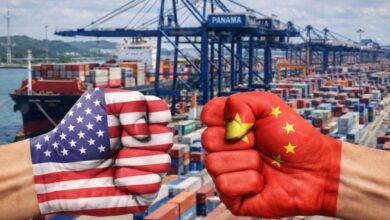The 2022 Winter Olympics Are Wrecking China’s Economy
Despite being in an economic crisis, China has invested huge amounts of money for the Winter Olympics.

Photo: TW-juegosolimpicos
LatinAmerican Post | : Anderson Ayala Giusti
The Winter Olympics place a heavy financial burden on the city of Beijing. Hosting the sporting event has required billions of dollars, and the figure has not stopped increasing due to the complications of COVID-19, while profits have collapsed. All in a context in which the Chinese economy is approaching unprecedented real estate and health crises.
Building or remodeling sports facilities, improving regional roads with railway systems, enhancing the hotel capacity, building three Olympic villages and covering quarantine hotels are just some of the expenses that the Chinese capital has had in recent years, to guarantee the development of the winter sports event. These expenses have been covered with money from taxes.
The initial budget of 3,060 million dollars that Beijing estimated in 2015, when it was selected as the host city, is now a dream. That budget rose to 3,900 million, according to the organizing committee, although that figure did not include expenses related to the Olympic villages, transport infrastructure or all sports facilities. It was a base budget of organization costs, as is often the case when submitting applications.
If we add to this the costs of the pandemic, which involve thousands of daily tests and the isolation of thousands of volunteers and other participants involved ( journalists, drivers, cooks, etc.), this means that the budget allocated by the city rises to almost 39,000 million dollars, that is, ten times more than expected, according to Insider.
It is true that not everything is expenses, given that the Games promote the sports development of the host nation, increase the tourist market, improve the country’s brand, and develop infrastructure . But the truth is that the monetary gains don’t even come close to equaling the costs. Of course, we cannot lose sight of the fact that the Chinese government is more interested in the prestige attracted by the Games, by showing itself as the new world superpower.
Also read: Sportswashing, Sport as a Public Image Strategy
What does the city get to keep? Only the income from local sponsors and from the sale of merchandise in the Olympic complexes, since the sale of tickets for this edition was also eliminated. At a time when COVID-19 infections are beginning to occur more frequently in the country before arrival, the organizing committee decided that spectators would enter the complexes only by “invitation” (more than 150,000 were expected) , and that the capacity would be limited to 50%.
It is the International Olympic Committee (IOC) that receives substantial income from global sponsorships and broadcasting rights. This distinction is necessary to get an idea of how profits are distributed, and why they end up being so much less than costs.
If you think about that expense of more than 39 billion dollars, and that the benefits estimated by the organizing committee are a few billion, there remains a gigantic deficit that has to be assumed by the government of Beijing and the national government. A really unviable public debt for any city.
But COVID is not the only emerging threat in the Asian nation. Since the end of last year, the country has been facing a complicated real estate situation, with signs of entering a spiral of crisis. In an economy where this sector contributes 29% of the national GDP, any possible collapse would be fatal for millions of Chinese citizens.
To clarify the matter, the debt that in September 2021 affected the real estate giant Evergrande, with an amount of more than 300,000 million dollars, was only the tip of a deep iceberg. Other companies such as Fantasia Holdings, Sinic Holdings, and Modern Land are in a similar situation, and a hypothetical massive bankruptcy would generate the collapse of the entire sector. In fact, according to the firm Bloomberg, two-thirds of the 30 main homebuilders in the country have crossed the red lines of indebtedness, becoming unsustainable.
The Chinese government has taken measures to try to prevent a crisis like the one in 2008, but for now their attention is focused on the current Winter Olympics. And while these can boost tourism and the development of Beijing as the host city, from a financial point of view they are not profitable at all. Of course, their celebration seems beneficial for the government, which despite assuming the costs with public money, gains revenue and international projection, despite the diplomatic boycott undertaken by several Western countries against the violation of minority rights in the Asian giant.




